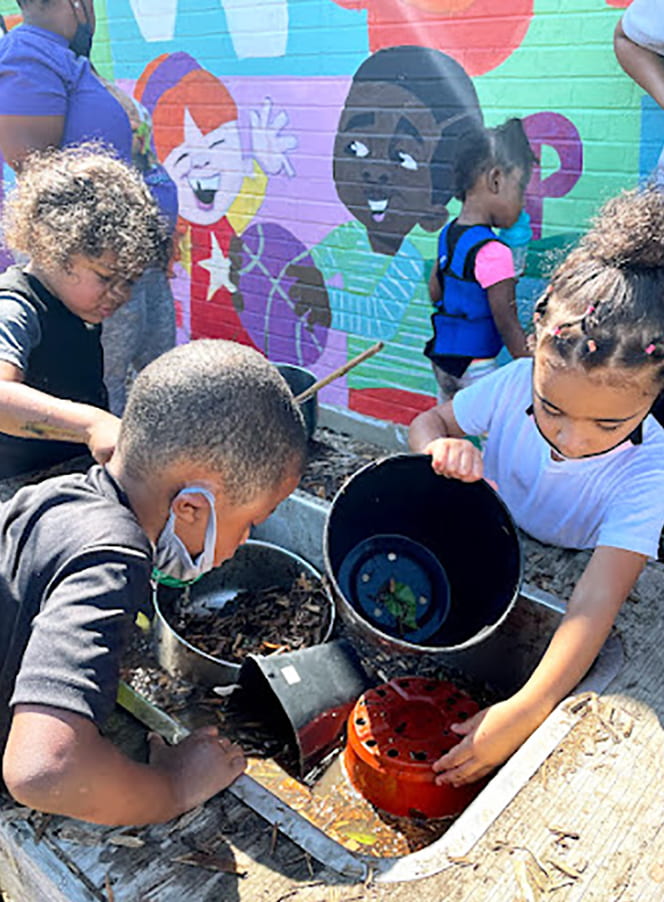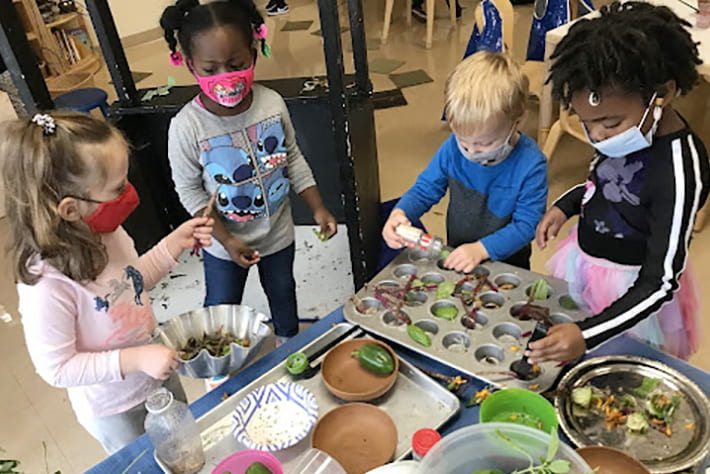Even when their play is mud-pie messy, preschool children are learning skills they need for socializing, language, and math.

“Young learners are capable of higher-level thinking, and much like adults, they appreciate authentic work,” says Corrie Hamilton, a teacher at Julia Goldstein Early Childhood Education Center (JGECEC) in University City, where plans are underway for a mud kitchen. Complete with pots, pans, water and other ingredients, the new outdoor classroom will give the Center’s three, four and five-year-old cooks a space for garden and kitchen play that not only has universal kid appeal, but also provides a way to start talking about concepts like fractions.
“Talking about ‘half-a-cup’ and discovering that two halves make a whole is fraction work, and we can build those concepts into conversations and play in a natural way,” says Hamilton. “We are creating the framework that establishes what it looks like to be a strong math learner.”
Early childhood math skills are important predictors of later academic achievement, but opportunities for young children to engage in math learning are extremely limited in preschool.
With support from the Institute for School Partnership at Washington University in St. Louis (ISP), the JGECEC teaching team is making sure their new mud kitchen and curriculum throughout the building are planned with early math learning in mind.
Launched in Fall 2021, the Math314 Early Childhood Mathematics Research-Practice Partnership is just the kind of collaboration that ISP does best: working alongside educators to share the latest research in STEM content delivery and helping schools and districts create equitable learning environments that encourage student curiosity. ISP’s Math314 staff benefit as well, gleaning critical insights from teachers who are doing the day-to-day classroom work.
“What we learn together in partnership with the team at Julia Goldstein has the potential to significantly increase the frequency, rigor and cultural relevance of math learning in early education programs throughout the St. Louis region.”
Joslyn Richardson, ISP mathematics instructional specialist
The two-year pilot project’s focus on early childhood is an extension of Math314, an innovative professional development program launched by ISP in 2019 to improve math instruction and boost student enthusiasm and scores in the region.
Making room for meaning
The Julia Goldstein team had already identified the new mud kitchen as a priority when their work with ISP began in August. Both teams quickly identified the project as the perfect way to build opportunities for math learning into their planning.
Inspiration for the new learning space sprung from the students themselves, whose enthusiasm creating stews, soups and mud pies with random pots and pans on the playground, led the teaching team to think about how to formalize a space that encourages even more of the kind of play to which children naturally gravitate. The mud kitchen will have a sink, storage, running water, and even a window – perfect for food-based play that has context for young children.
“I’ve been teaching early childhood for a long time,” says Hamilton. “Every child, regardless of race, gender, knowledge level or learning style seems drawn to playing ice cream shop and restaurant.”
Crystal Cauley, the school’s longtime principal, says her team is poised and ready to tackle the research partnership with ISP, motivated by the long-term pay-off for children from high-needs backgrounds.
“Our entire staff has a shared vision for this work,” says Cauley, who hasn’t been willing to let COVID-19 challenges stop their progress. “Being intentional about our work is already built into how we operate, so why wouldn’t we keep moving forward? Anything we can do to move our children through lifelong learning that is very meaningful is worth the effort.”
The school adopted the Reggio Emilia approach to learning in 2014. Based on the belief that children have the potential, curiosity and an inherent interest in constructing their own learning, this non-traditional mindset lends itself to thoughtful, student-led learning. The result is a learning environment where children have the space to negotiate with everything the environment brings them.

“Our students are making decisions about their own learning,” says Cauley. “The mud kitchen and our other efforts with ISP are really just an evolution of the work we’re doing. It’s a natural transition of our intention to engage students in learning that is meaningful. Having the Math 314 team help us create a plan for how to address math learning is something we’ve been wanting and needing. It helps to have other sets of eyes helping us think about the work. Our teachers have been so immersed in doing it, that this collaboration gives our team an opportunity to step back and ask ourselves, ‘Are we getting what we want?’”
Equitable math learning: With purpose and on purpose
At the heart of ISP programs is the belief that all students should have access to high-quality learning. Getting there is complicated, especially in mathematics.
It is well documented that Black and Hispanic students are underrepresented in eighth grade algebra courses. The lack of access and readiness leads some scholars to refer to the inequity as one of the most pressing civil rights issues of our time. Disrupting this pattern requires a thoughtful cast downstream into early childhood and elementary schools, where opportunities to build early math skills are systemically lacking. For low-income children, weak math knowledge at school entry lends itself to compromised math skills throughout the elementary years and beyond.
“One way to impact the trajectory of children with low-income backgrounds who experience persistent difficulties in math is to target early math skills,” says ISP Executive Director Victoria May. “By focusing on frequency of math activities, as well as the type and quality of content, we can develop the practice-based evidence necessary for scaling our efforts to impact other early childhood schools in the St. Louis region.”
So what does equitable math learning look, sound and feel like in an early childhood classroom?
“I have 18 students this year, which means 18 different knowledge levels, learning styles and individuals to include in our work. We work really hard to find out where kids fit into each project, to ensure inclusion. There are a lot of ways to incorporate literacy and math skills into a project, especially one that has purpose.”
Corrie Hamilton, teacher at Julia Goldstein Early Childhood Education Center
Slated to be open for business in April, the new mud kitchen has all kinds of messy learning potential: counting and measuring ingredients and servings, ordering and paying for pretend food, and testing new recipes sure to please industrious chefs who are making sense of their world.
Keeping families engaged and supportive of the nontraditional, student-led learning environment is part of Cauley’s role as principal.
“When our parents see and hear their children coming home and talking about their school day, and observe them making strong choices for themselves, they are very supportive. Their only complaint might be the muddy shoes!”
This project is made possible with generous support from an anonymous donor and the University City Education Foundation.
Media contact: Anne Heinrich